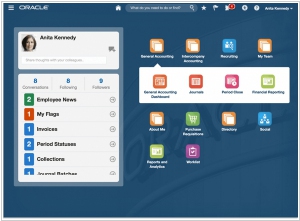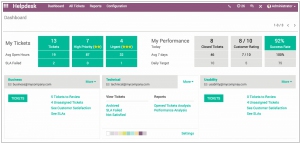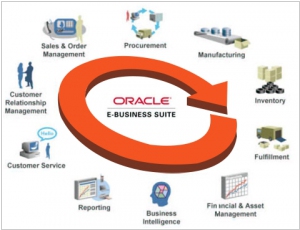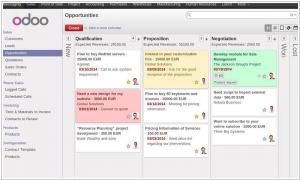Odoo vs Oracle ERP
June 05, 2023 | Author: Michael Stromann
14

Oracle Enterprise Resource Planning (ERP) Cloud is a suite of cloud applications for finance, project management, procurement, risk management, and other core day-to-day activities important in every business, regardless of size, industry, or geography. Designed from the ground-up with a modern architecture and technology, Oracle ERP Cloud is natively connected with all Oracle enterprise cloud applications and scales inherently to support added users, transactions, and sites as your business grows by size and into new markets across your country or the globe.
Odoo and Oracle ERP are both powerful enterprise resource planning (ERP) solutions, but they have distinct differences in terms of their offerings and target markets. Odoo is an open-source ERP software that provides a comprehensive suite of applications for various business functions, including accounting, inventory management, CRM, project management, and more. It is known for its modular and customizable approach, allowing businesses to select and configure the modules that best fit their needs. Odoo is popular among small to medium-sized businesses seeking a flexible and cost-effective ERP solution. On the other hand, Oracle ERP is a robust and scalable ERP system designed for large enterprises. It offers a wide range of industry-specific modules and advanced features for finance, supply chain management, human resources, and more. Oracle ERP is recognized for its extensive functionality, integration capabilities, and support for complex business processes.
See also: Top 10 Online ERP software
See also: Top 10 Online ERP software
Odoo vs Oracle ERP in our news:
2019. Odoo grabs $90M to sell more SMEs on its business app suite

Belgium-based Odoo, an all-in-one business software provider, has raised $90 million. Odoo offers both an open source version and subscription-based enterprise software and SaaS solutions. Since its establishment in 2005, the company has achieved significant profitability and sustained 60% annual growth. Odoo primarily focuses on serving the SME business apps market, competing with major players such as Oracle, SAP, and Zoho. Through its Enterprise platform, Odoo offers around 30 applications, including ERP, accounting, stock management, manufacturing, CRM, project management, marketing, human resources, website, eCommerce, and point-of-sale apps. Additionally, a vibrant community of over 20,000 active members has contributed over 16,000 apps to the open source version of Odoo's software, catering to a wide range of business requirements.
2014. Oracle E-Business Suite unveiled cloud-centric apps

Oracle has recently updated its ERP solution, E-Business Suite, with enhanced integration with the company's cloud services and improved tablet compatibility. The Financials module now integrates with Oracle Revenue Management Cloud, allowing users to take advantage of the revenue compliance and recognition benefits offered by that product. Furthermore, enhancements in Project Contracts and Project Billing enable U.S. federal contractors to optimize cash flow, increase transparency, and automate billing processes. The Purchasing module has also received improvements to enhance buyer productivity when handling large orders. These changes include the introduction of Web ADI-enabled spreadsheet creation and modifications to purchase order lines, schedules, and distributions. Web ADI, also known as Applications Desktop Integrator, is Oracle's tool for integrating its applications with Microsoft Excel.



